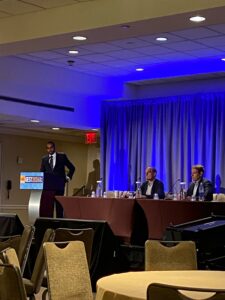
A single-centre, retrospective review has reported 13-year data confirming cryoablation as a “highly effective” treatment modality for solitary T1a renal cell carcinoma (RCC) with low complication and recurrence rates.
Interventional radiology fellow Ahmed Awad (The University of Texas MD Anderson Cancer Center, Houston, USA) presented these data at the recent Global Embolisation Oncology Symposium Technologies (GEST; 16–19 May, New York, USA). Cryoablation has emerged as an “attractive treatment option” for small renal masses, Awad stated, due to “favourable” intermediate- and long-term outcomes and its subsequent inclusion in the National Comprehensive Cancer Network (NCCN) guidelines alongside thermal ablation techniques.
Investigating the long-term experiences of their centre, Awad described their review, which regarded adult patients with a confirmed histopathology of solitary RCC with tumours of less than 4cm who received percutaneous cryoablation between January 2008 and December 2021. Exclusion criteria included patients with a prior history of RCC, patients with RCC metastases at the time of ablation or patients found to have multiple renal metastases at the time of the procedure.
Awad noted that overall survival, local recurrence-free survival, disease-free survival, metastases-free survival, and cancer-specific-free survival were each measured in this cohort.
Of the 86 patients included in their cohort, 57 were male and 29 were female. The median age in this population was 69 years and the median size of RCCs treated was reported as 2.7cm. The most common subtype of RCC was clear cell carcinoma, making up 63% of patients, and 4.6% of patients had a grade 3 or higher complication rate, which Awad defined as the requirement of any kind of intervention.
The median overall survival rate following cryoablation was 10.3 years. At five year follow-up, overall survival was 69%; “this stems from the fact that 60% of our population has another primary malignancy which confounded their overall survival”, Award reported. Local recurrence-free survival was 93.5%, five and 10 years disease-free survival was 91% and 84% at follow-up, respectively, and median disease-free survival was 7.8 years. Additionally, both metastases-free and cancer-specific-free survival were 100% at 10 years.
“Our results show that cryoablation is highly effective in treating T1a RCC. Our continued collection of long term follow-up data will favour additional quality and survival outcomes,” Awad said. “Cryoablation provides us the ability to visualise the ablation zone and the opportunity for a more controlled and confident approach both when planning and executing the procedure.”
Following the presentation, session moderator Bradford Wood (NIH Center for Interventional Oncology, Bethesda, USA) commended Awad and his team at MD Anderson for their research efforts, stating that theirs is one of the “greatest experiences” of the use of cryoablation for T1a RCC to date. He added that “caveats” in the most recent NCCN guidelines “keep [interventional radiologists] out of the mix and keep patients from hearing that [cryoablation] is an option”, so congratulated Awad on the addition of their data to the growing body of evidence which supports the use of cryoablation in this pathology.










